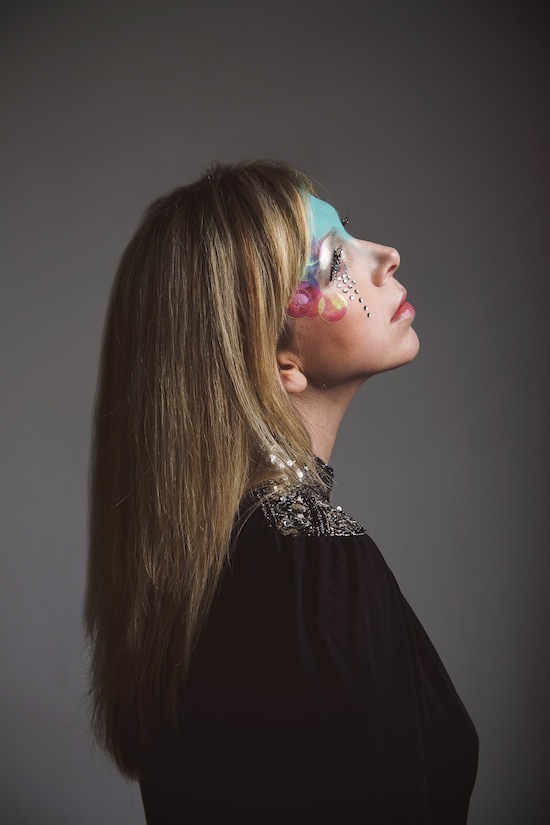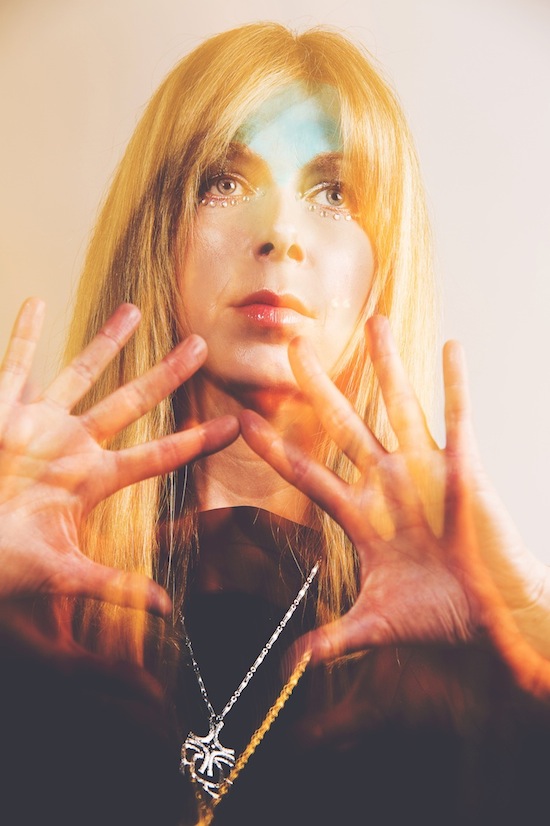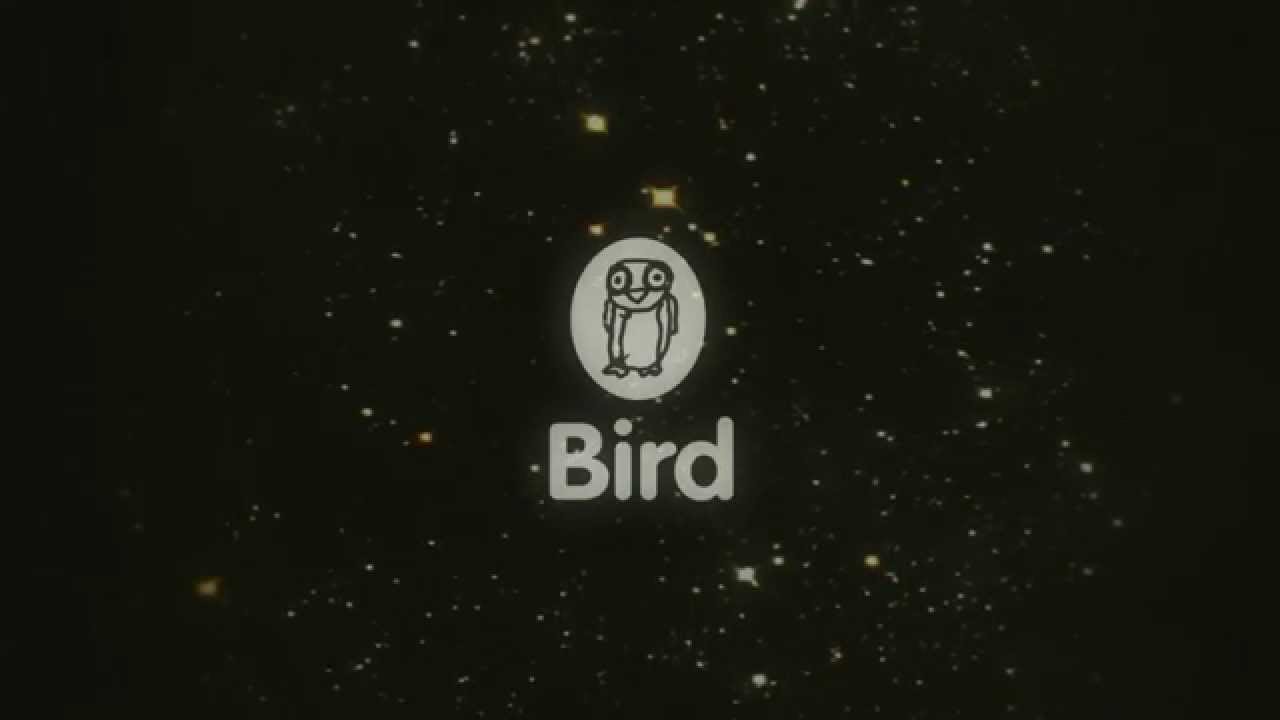In 1988, On The Silver Globe, a film by Polish director Andrzej Żuławski, was premiered at the Cannes Film Festival. The movie was based on a book written by Żuławski’s granduncle, Jerzy, and told the story of a group of astronauts who leave Earth to start a new civilisation. Żuławski – who is perhaps best known for his 1981 horror flick Possession – began writing the screenplay for On The Silver Globe in 1975, but the Polish government at the time interpreted the tale as a thinly-veiled parable about the struggles against totalitarianism and shut down the project. The film – and a hastily cobbled together version at that – was only subsequently released after the communist regime had been overthrown.
The movie is also the source of inspiration for the title of Manchester-based musician Jane Weaver’s sixth solo album, The Silver Globe. And like Żuławski’s film, The Silver Globe has not had the easiest, or quickest, of gestations. However, Weaver may well have produced her masterpiece; The Silver Globe is a magnificent record fusing spaced-out prog rock, samba-specked electronica, Buck Rogers-style disco, Motorik beats, Aussie-style Krautrock, vintage synths and Weaver’s celestial voice.
And while The Silver Globe is a concept album, the narrative always ensures that Weaver’s elegant songwriting is central to the record’s allure. Written and recorded sporadically over the intervening years since 2010’s Fallen By Watchbird album, The Silver Globe also contains the accumulation of some seriously talented guest appearances – David Holmes produces two tracks, Damon Gough provides a noodly guitar solo on ‘Don’t Take My Soul’, Aussie space-rockers Cybotron add sax to the epic ‘Argent’, while Suzanne Ciani’s Buchla waves grace the opening title track.
Jane Weaver has been an ever-present figure on the Manchester music scene for over 20 years. Her first band, Kill Laura, released three singles on Rob Gretton’s Manchester record label and her solo career was initially backed by early incarnations of Doves and Elbow. Married to producer and Finder Keepers label-owner Andy Votel, Weaver also runs Bird Records, a boutique imprint that has championed the likes of Cate Le Bon, Maxine Peake and Beth Jeans Houghton.
We meet at a cosy pub in Marple Bridge, a sleepy village tucked under the edge of the Peak District. And if The Silver Globe is complex, visionary and bursting with invention, its creator is the epitome of Northern pragmatism and dry humour. Jane talks about her frustrations with the music industry and how, rather than let her dissatisfaction contain her creativity, The Silver Globe became a the conduit for a freedom of artistic expression and the defining album of her stellar, if vastly underrated, career.
I am imagining that The Silver Globe was an epic undertaking. When did you first begin to think about making the album and what was the initial inspiration?
Jane Weaver: I started writing the album about three-and-a-half years ago. I had just done a mini-soundtrack album at Eve Studios [in Manchester], which is a really amazing place. I did a sort of experimental, atmospheric, Morricone-inspired record in three days. I knew I loved the studio and that I wanted to do more experimental stuff. Due to certain restrictions – things going on in my life and financial constraints – I knew that when I started writing the new album, it wasn’t going to be a three or four day recording stint, or the kind of thing I could do at home or even in a small studio. The things I was hearing made me realise the album would be an epic job. I quickly realised these songs were getting very complicated. That’s why it has taken me so long to do because I wanted to work with different people and try different studios – and that’s why it has taken three-and-a-half years.
The album title is taken from the film On The Silver Globe by Andrzej Żuławski. What was it about that piece of cinema that resonated with you so much?
JW: I don’t know at what point I saw the film, On The Silver Globe, but I felt an immediate connection with it. On The Silver Globe is about a bunch of astronauts that go to another planet and start a new civilisation and it all got me thinking about a revolution and a post-apocalyptic theme. I was frustrated with what I was doing at the time and I was struggling. I felt I hated the music industry and the way it works. When I first started making music there was a certain process that was followed in general, but now there is this big free-for-all thing, which is amazing and I am not down on it at all, but it made me think about where everything will end up and questioning why I was making music as an artist. It was a ‘What is the point?’ moment: "Why am I spending all my money on this art project when I shouldn’t really be as I have a family?"
So had did that trigger you to make your most ambitious album yet?
JW: I think I had just got to the point where I realised that you just have to see yourself as a painter, who is just painting and painting, and some of it is good and some of it is bad, and to just keep going. You have to do it for you and forget about the world outside. Also, since the last album, I had been getting bored with the singer-songwriter thing and the limitations in what was expected of me. I am in a brilliant position; I have a label and work in conjunction with Finders Keepers, and can basically do what I want, so why was I limiting myself? I’d almost brainwashed myself. That was part of the reason I tried to push myself further into doing more experimental stuff.
You have worked with a number of collaborators on The Silver Globe. Were you writing song parts with specific people in mind?
JW: No. A lot of it was accidental. For example, I have known David [Holmes] for years, and I was going to LA anyway and it just so happened that David was living there. He asked me to visit him in this "amazing" studio he was working at. I haven’t worked with a producer for years – I do a lot of it myself. I trusted David, gave him the demos and asked him to do what he wanted. I let him takeover – which I’d not really done before.
How did that feel?
JW: It’s pretty weird; sometimes he would say "that’s pretty bad" or "that doesn’t really work" and I would be like [forces smile] "Okay David." But, it worked out for the best as I got great tracks out of it [‘Arrows’ and ‘Stealing Gold’].
How often do you work on songs with Andy [Votel]?
JW: Now and then. We don’t tend to sit down and write together – would probably argue as we would both think we are right. I respect and appreciate where Andy’s strengths are. He is amazing at arranging and remixing and adding little flourishes to things – production-wise – that I wouldn’t necessarily think of. When he heard ‘Don’t Take My Soul’ he wanted to do something with the track and he got Damon [Gough], who I have always wanted to work with, to do a little guitar part. I let them get on with it – just gave them the song and left them alone in the studio.
The Silver Globe is very atmospheric and, to my ears, has a very cohesive aesthetic. What was your thought process in developing the feel of the album?
JW: At the time I was listening to a lot of Yoko Ono’s Fly and Approximately Infinite Universe and I had this idea of getting a really kosmiche-sounding backing recording. I now have a band, so when I was hearing these songs I knew that a lot of them were one loop but with repeated for about ten minutes. I thought it would be amazing to go into the studio and record all the backing live. Other aspects were more spontaneous – I had Suzanne Ciani do some Buchla waves [on ‘Cells’] and Andy also managed to contact Steve Maxwell from Cybotron to do a sax solo [on ‘Argent’]. Steve was in Australia and the whole thing was pretty crazy as I wanted a kind of connection with the club scene from the Mad Max movie.
Is a lot of your music inspired by films?
JW: It can be. I think with films, a lot of the stuff I watch is to do with Finders Keepers’ soundtracks. It is through Andy’s projects, where I will be sitting down to try and do my work and there will be a dreadful vampire film on in the background, which he is doing the soundtrack for. I’m forced to watch lots of lesbian vampire films at nine in the morning! I have to tell him to shut the curtains so the neighbours can’t see in! I will say that a lot of film stuff that I like has come from that route and has just caught my eye. So, yeah, all the horrific soundtrack stuff is on the album.
Ultimately, The Silver Globe seems to end on a very upbeat note. My two favourite tracks are the closing ‘If Only We Could Be In Love’ and ‘Your Time In This Life Is Just Temporary’ that both feel very positive.
JW: They are positive. There a few doom moments on the record but there is a resolution, because there is a sense of that we are all only in this world for a few years and many tragic things happen – and have happened to me in my life where people have died – and it makes me think "What am I worried about?" in a kind of Zen moment. We have to crack on with it and stop moaning.
You have talked about The Silver Globe being your most ambitious album. Once an artist has unshackled themselves is there a danger of endless opportunities and being unable to focus on an end result?
JW: Absolutely – at various points I thought I was having a massive meltdown. It can be very hard to reign in. I was continually adding to the tracking of a song, but I would then have to go through all the keyboard tracks I’d done and pick the ones I wanted to keep. It can become a bit of a nightmare. But, all of this just takes time and I did want it to be right and I did want it to sound good.
The Silver Globe is your sixth solo album and you have been in bands since your late teens. Considering the scope of its experimentation, could you have made The Silver Globe 20 years ago?
JW: Not at all, although I would say that when I was younger I was quite ambitious about pushing myself. When I was in Kill Laura, we always used to really try and perfect takes of everything. I did always hear grand things in my head but it has taken me to get older to become a bit freer and more courageous. I now don’t care about what is expected of me or the pigeon-hole of me. I know what I want to do and that only comes with age.
You are originally from Widnes in Cheshire. Is there any sense that The Silver Globe reflects images and memories from your childhood?
JW: Definitely. When you look at post-apocalyptic films, there are always nasty-looking power plants and general desolation. When you go through Weston Point in Runcorn, and my mum used to work down there, it would always look like a city – a crazy-looking city. My thing about Widnes is that growing up there feels like a bit of a no-man’s land. You might go out in Liverpool and Manchester but you are from Widnes. When I was about 14, I would latch onto anything different or unusual – bikers or hippies or punks – because I thought they might go to the city now and again. It was exciting. That’s what I would do growing up – latch onto people who looked a bit different. Some of them were a bit crazy but I am nostalgic and thankful for that weird part of my life.

The album is being released by your own record label, Bird. What was the philosophy behind setting up the label?
JW: Firstly Bird is my boutique imprint through [the] Finders Keepers [label] – I couldn’t do it without Finders Keepers. The thing with Bird is that I always wanted to release stuff that people wouldn’t necessarily hear because it wasn’t getting championed. Take Emma Tricca – I saw her at the early days of the Green Man festival and she was wearing white high heels in a muddy field and I thought "She’s brilliant" – it would be people like that who would catch my eye. I wanted a bit of an underdog thing and it is the same with any reissue stuff we’ve done – stuff that people haven’t heard or has floundered, and which I happen to think is really good. We tend to find people and stick with them – it’s all down to working with people that you want to have a family-community thing with. It’s good and I am happy I can put other people’s records out.
Why is the ‘family-community’ aspect thing so important to you?
JW: Previously, I had been ‘brought up’ to believe that you had to go through the ‘record industry process’. When I first met Andy, Twisted Nerve were all doing it themselves. When I started with Rob Gretton’s label he was really into the community thing, where we felt we didn’t have to go to London and we could have our own record industry in Manchester – I loved the fact it was really resourceful.
I read a quote from you that suggested you didn’t like playing live. Why is that?
JW: I have hated doing stuff on my own as I just don’t like the pigeon-hole of sitting there with a guitar, strumming away, and it means there is so much detail from the recordings that people are not hearing. It’s important to get that across. I now have a band that has been with me for over two years and so we have been able to carve out a live sound.
How difficult has it been to transfer the complexity of the The Silver Globe to a live setting?
JW: Well, it does work. The recent gigs have been good, so far. It’s not 100 per cent like the album as some of the recorded parts I did were spontaneous and I cannot remember how I did something on a Moog, for example.
You are touring with Lætitia Sadier [of Stereolab fame]. How did that opportunity come about?
JW: I met her a while back and then more recently when she was doing some stuff in Manchester. I have a lot of respect for Lætitia; her new album has a lot of sublime moments and as a person she is lovely and warm and generous. I can’t wait to do some gigs and drink some wine with her.
Ahead of the tour, the reaction to the album seems extremely positive. Have you been pleased that people seem to ‘get’ the concept?
JW: I have been amazed. The response has been fantastic. I have a kind of disbelief really. Although I am really pleased that people seem to like it, what I’m excited about the idea that it might lead to other things, and that I might get an opportunity to work with different people and new collaborations. For example, I want to do some film stuff and have always wanted to do a weird musical.
The Silver Globe: The Musical?
JW: Exactly. It could be like Phantom Of The Paradise. The good thing about a positive reaction to what you have done is that it can lead to those creative opportunities. That’s what I am excited about.
As for the future, what next? How will you follow The Silver Globe?
JW: I have been thinking about this recently. It’s taken so long to do this one and it was almost like how you feel after eating a rich plate of food, in that I now think I want to do something simpler, maybe. Almost going to the opposite of what I’ve just done. I need to eat a salad next! This album is the most comprehensive thing I have done so I don’t know how I could make it bigger.
The album The Silver Globe is out now via Bird Records.
Jane Weaver and Laetitia Sadier are playing at Cafe Oto, London on Friday December 5




